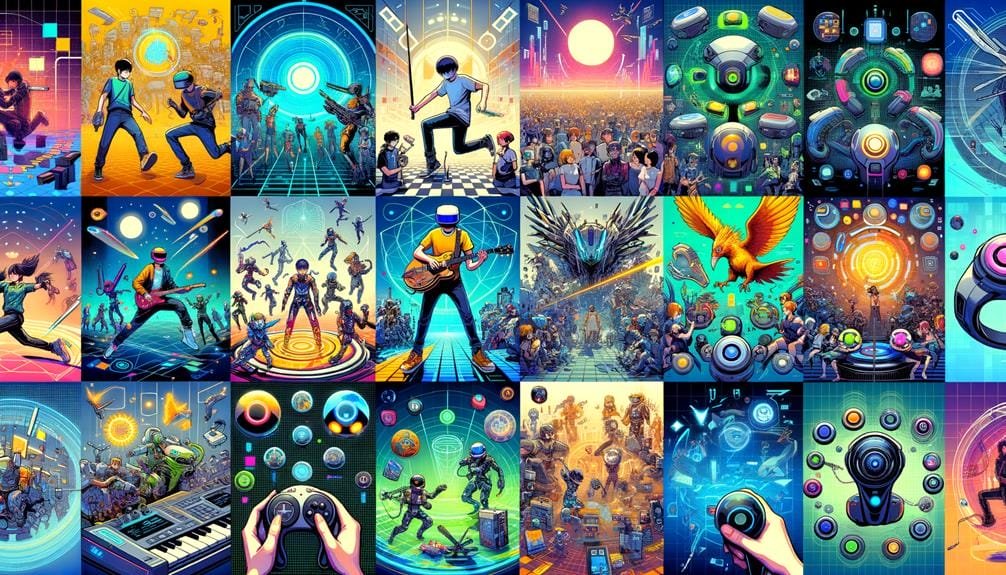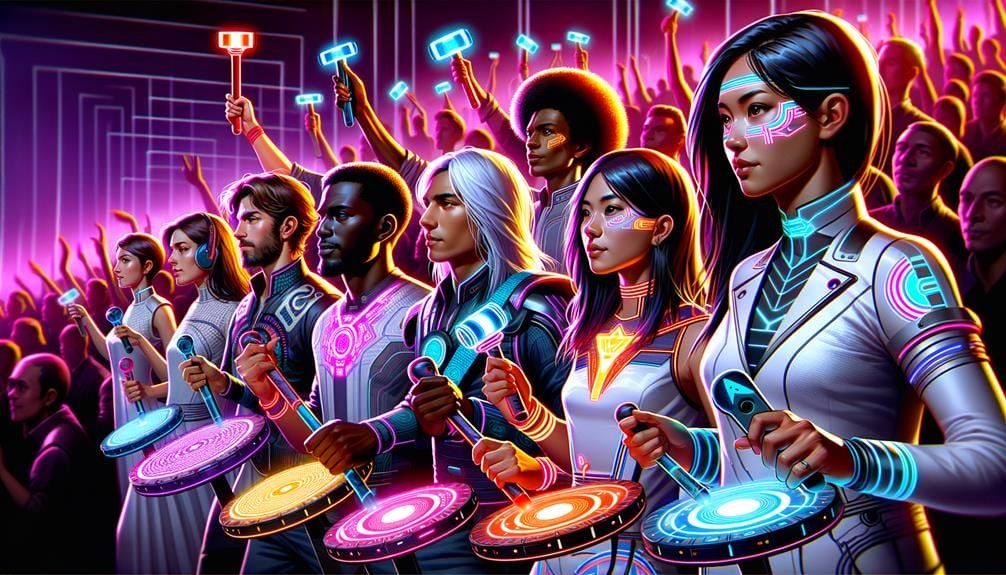Our Newsletter
Sign up for our e-mail newsletter and stay informed for what’s next on the horizon.
Could it be that 2024 has bestowed upon us the finest music and rhythm games to date?
This year has presented a diverse array of innovative, immersive, and engaging experiences that have expanded the genre’s limits.
Whether it’s the exhilaration of cutting beats in virtual reality, the excitement of blending rhythm with roguelike features, or the familiar melodies of classic games, it makes us ponder: could this be the golden era of rhythm games?
Let’s scrutinize this fascinating hypothesis together.
Is it possible that 2024 has gifted us with the most superb music and rhythm games we’ve seen?
This year has introduced a wide range of inventive, captivating, and absorbing experiences that have pushed the boundaries of the genre.
Whether it’s the thrill of slicing beats in a virtual environment, the joy of merging rhythm with roguelike elements, or the nostalgic tunes of iconic games, it prompts us to consider: could this be the golden age of rhythm games?
Let’s examine this intriguing proposition together.
In the varied sphere of rhythm games in 2024, Beat Saber, Metal: Hellsinger, Thumper, Rocksmith 2014 Remastered, and Crypt of the Necrodancer have climbed to the pinnacle of the PC platform due to their innovative gameplay techniques and immersive experiences.
Beat Saber continues to hold its top position through its engaging gameplay and custom song support, enabling us, the players, to engage with the music on a more personal level. We’ve enjoyed the unique metal soundtrack of Metal: Hellsinger, relishing the liberty of its mod support for broadened music choices. The intense rhythm violence of Thumper has amazed and exhilarated us, leading us to suggest headphones for the full effect.
We’ve appreciated Rocksmith 2014 Remastered not just as a game, but also as a learning tool that lets us connect our own instruments and learn more than a thousand tracks. Also, we’ve been tested by Crypt of the Necrodancer’s unique blend of roguelike components with rhythm-based mechanics.
Each of these PC games has made a substantial contribution to the music game genre, providing us with a diverse range of experiences that engage, amuse, and instruct.
Let’s shift our focus towards some of the developing music games that are enthralling gamers globally. From novel rhythm game elements to their influence on the gaming sector, these games are reshaping our expectations from the genre.
It’s a thrilling period for rhythm game fans, as the scenario continues to transform and provide new, engaging experiences.
Ever pondered the inventive qualities that render rhythm games like Thumper, Crypt of the NecroDancer, and Dance Dance Revolution so engaging? It’s all about the pulsating rhythm and the exclusive, immersive methods these games employ it.
These inventive features have genuinely reshaped the rhythm game genre.
Emerging in the music game genre, we find groundbreaking contenders such as Audica, Pistol Whip, Synth Riders, and Unplugged, who are transforming the world of virtual reality rhythm games with their distinctive gameplay mechanics.
Audica and Pistol Whip are at the forefront, incorporating the rhythm genre with a shooter twist. Synth Riders provides a dance-centric VR experience that’s entrancing its expanding multiplayer community. Unplugged revitalizes the Guitar Hero era, using hand tracking technology to deliver a deeply engaging musical experience.
These games are merging music and rhythm with VR’s immersive potential, offering players innovative ways to enjoy their favorite songs. As VR games keep progressing, these titles are laying the groundwork for the future of music games in VR.
Games such as Audica, Pistol Whip, Synth Riders, and Unplugged are setting the standard for a new generation of VR rhythm games. Simultaneously, other games like Metal: Hellsinger and Thumper are contributing significantly to the evolution of the rhythm game genre, thanks to their unique gameplay mechanics and engaging soundtracks.
Taking center stage, Dance Dance Evolution, Rock Band, Guitar Hero, and Osu! persist in igniting the scene in 2024 as the noteworthy dance games of the year. Each of these games has etched a distinct place in the rhythm gaming world, offering an unrivaled gaming experience that retains its fanbase.
Dance Dance Evolution, with its lively gameplay and signature pad controls, recalls the thrilling liberty we find in rhythm and movement. In the meantime, Guitar Hero’s distinctive controllers and flourishing custom song community have cemented it as a must-have in any music game enthusiast’s collection.
Here’s a more detailed look at these games:
| Game | Unique Feature | Community Impact |
|---|---|---|
| Dance Dance Evolution | Signature pad controls | Energizes and engages players |
| Rock Band | Variety of instrument options | Fosters social interaction in band-like setup |
| Guitar Hero | Distinctive controllers and custom songs | Maintains a loyal fan base |
| Osu! | Competitive tournaments | Highlights player skills |
These noteworthy games symbolize the progression of rhythm gaming, each one a tribute to the joy of music, liberty, and communal experience. They not only amuse but inspire, demonstrating that rhythm games have secured their position in the gaming universe.

In the exciting domain of gaming tournaments, the influence of rhythm on performance is considerable.
Looking at instances from competitive gaming, we see rhythm games persistently push players to develop their abilities, refining their timing and accuracy.
We’ll examine how rhythm not only forms the gameplay and tactics but also encourages a distinctive community bond among players.
Rhythm, without a doubt, plays a pivotal role in defining player performance and scoring precision in gaming contests. It’s not just about striking the correct notes, but also about mastering timing and pattern identification.
In essence, rhythm is a liberty that can lead to triumph in competitive gaming.
Immersing oneself in the exhilarating realm of competitive gaming brings to light rhythm games like Osu! which host high-stakes tournaments. These tournaments, a distinct fusion of music contests and gaming, spotlight the prowess, exactitude, and commitment required to succeed.
Consider the table below:
| Game | Type of Competition |
|---|---|
| Osu! | Points-based |
| Fuser | Freestyle |
| Beat Saber | Speed-based |
| DJMax Respect V | Score-based |
Every game presents its own distinctive competitive environment, tailored to enthusiasts who enjoy the rigor and severity of these games. Through these tournaments, players showcase their rhythm gaming expertise, competing for honor and rewards. This embodies the core of rhythm in competitive gaming.
While we appreciate the engaging spirit of these tournaments, it’s crucial to highlight the key role rhythm has in improving players’ skills and precision in these gaming tournaments.
In the end, rhythm isn’t just a part of the game; it’s the pulse that motivates players to outperform, innovate, and ultimately, enjoy the freedom of expression.

Let’s step into the universe of Meta Quest 2 and 3, where games like Beat Saber and Pistol Whip have transformed the rhythm gaming genre, gaining considerable popularity and achieving remarkable sales results. Beat Saber, racking up over $100 million in sales, is an undeniable proof of the allure of immersive rhythm games. Its engaging gameplay, where players cut through music blocks with light sabers, appeals to both experienced gamers and those new to the VR space.
Pistol Whip, alternatively, provides a distinctive mix of rhythm and shooting aspects. With challenging modifiers and updates such as Encore and Party Mode, it constantly improves the user experience and retains its player base.
But the innovation continues. Titles like Rez Infinite, Smash Drums, and Synth Riders each contribute their own unique spin to the rhythm gaming scene. Whether it’s the electronic music-centric gameplay of Rez Infinite, the controller-free air drumming of Smash Drums, or the dance-like movements in Synth Riders, these games provide a novel approach to the genre and create new pathways for rhythmic expression.
In the sphere of cloud gaming, platforms like Google Stadia and Microsoft xCloud have transformed how we engage with music/rhythm games, freeing us from the need for high-end hardware. By subscribing to these platforms, we gain access to a broad collection of rhythm games, playable on various devices, from smartphones to smart TVs.
Here’s what it entails for us:
Through these advancements, cloud gaming hasn’t only broadened access to rhythm games but also cultivated a dynamic and flexible gaming environment. We’re no longer held back by hardware limitations, and the freedom and portability that cloud gaming brings have truly redefined the rhythm gaming landscape.

As we adopt the adaptability and decentralization provided by cloud gaming, we’re also observing a fascinating shift towards beta games in the rhythm gaming scene. Beta games, offering early access to innovative features and content, provide us a special chance to experiment with and mold the future of rhythm gaming. It feels like receiving the keys to the rhythm empire ahead of everyone else.
Interacting with beta games isn’t just about gaining an early glimpse at the latest advancements. It’s about working together, sharing our ideas, and impacting the final result. We’re not just onlookers; we’re contributors in the gaming transformation.
In addition, beta games commonly offer enticing incentives for participants, a token of gratitude for our feedback and commitment. It’s a mutually beneficial situation: we receive unique rewards, and game developers get priceless feedback.
Participating in beta games also encourages a sense of ownership, generating a more profound connection with our gaming experience. We’re not only players; we’re part of the game’s growth. Hence, let’s grab the opportunity presented by these beta rhythm games and shape our gaming future collectively.
Yes, we hold the view that rhythm games do aid in refining a number of skills. These games are exceptional at developing hand-eye coordination, rhythm discernment, and concentration. They also serve as an enjoyable method of stress reduction that might potentially improve memory retention and cognitive capabilities.
For those new to rhythm games, we suggest starting with Beat Saber. Its straightforward game mechanics, coupled with the excitement of handling virtual sabers, provide a fun introduction. Another game to consider is Crypt of the Necrodancer, which offers an interesting combination of rhythm and roguelike elements.
A common query we get is about games that have similarities with osu! In a related category, one can find ‘Beat Saber’. It’s a virtual reality rhythm game that integrates music and motion, offering a distinctive twist on the rhythm genre.
Yes, rhythm game contests do exist. Competitors have demonstrated their accuracy and expertise in competitions for games like Osu! and Beat Saber. This thrilling element amplifies the involvement of the community.
Sign up for our e-mail newsletter and stay informed for what’s next on the horizon.